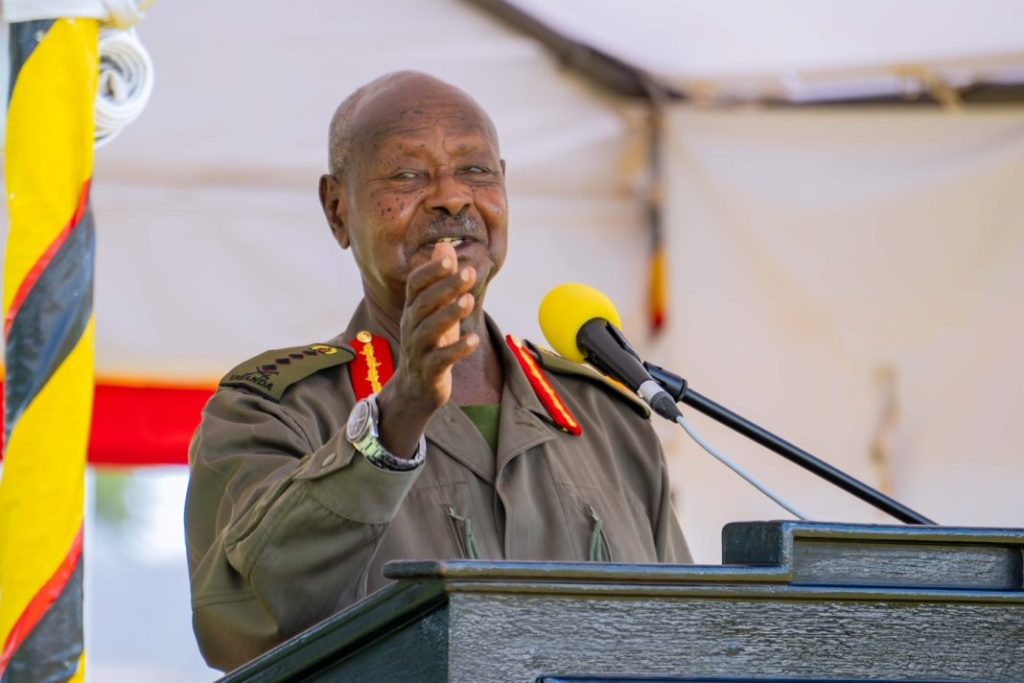In a tribute to the late Gen. Aronda Nyakairima, President Yoweri Kaguta Museveni has today praised his transformative impact on Uganda’s voter identification system, which has been a cornerstone of the country’s stability.
President Museveni made his remarks during the memorial thanksgiving ceremony for Gen. Aronda at the Commonwealth Resort Munyonyo.
Earlier on ,the ceremony was preceded by a service officiated by All Saints Cathedral, Kampala, and led by Rt. Rev. Onesmus Asiimwe, Bishop of North Kigezi Diocese, with assistance from Rt. Rev. Emeritus Patrick Tugume.
This event marked the final day of the three-day 2024 Kampala Defence and Security Expo, which commenced on Tuesday, September 10, 2024.
The expo was held under the theme: “Celebrating the Life of Hon. Gen. Aronda Nyakairima; A Paragon of Revolutionary Sacrifice, Pan-Africanism, Patriotism, Courage, and an Accomplished Freedom Fighter.”
President Museveni stated, “When I appointed Gen. Aronda as Minister of Internal Affairs, he tackled a problem that had plagued Uganda since independence, the accurate identification of Ugandans, particularly voters.”
He highlighted that the 1962 elections were marred by widespread fraud orchestrated by the Uganda People’s Congress (UPC) and Kabaka Yeka.
“Each party had its own box, and voters were secretly directed to fill boxes in favor of UPC. The boxes, marked with symbols like the hoe for DP and a finger for Kabaka Yeka, were manipulated to ensure results favored the UPC. This level of deceit undermined the entire electoral process, making MPs unaccountable and indifferent to their constituents,” he noted.
Following Amin’s removal in 1980, Museveni said his government sought to reform this corrupt system.
“Despite our efforts to introduce transparent practices like one ballot box per polling station and public voting, cheating persisted with multiple registrations and fake ballot papers,” he explained.
To combat this, Museveni introduced the idea of electronic voting with fingerprint identification, a concept he proposed two decades ago.
“Fingerprints are unique; Gen. Muhoozi’s are different from mine,” Museveni noted.
Initially met with skepticism, the President said the technology was refined through a partnership between Uganda and a German company, which proposed scanning the entire hand to ensure accuracy.
He added that although the machines were procured, a legal loophole allowed manual voting if the machines failed.
“The law must be amended to state that if the electronic system fails, elections at that polling station should be suspended,” Museveni asserted. “Aronda’s efforts were significant, but the law still left room for cheating.”
President Museveni also praised Aronda’s discipline and the cultural significance of remembering such contributions.
“Thank you to the Chief of Defense Forces (CDF) and the Ministry for organizing this remembrance for Aronda. This remembrance is crucial for justice and education, providing a forum for retired and serving officers to unite,” he said.
“I salute those who organized this remembrance ceremony . This is a good culture because it does justice to those who sacrificed , so people get know what they did. We have now done justice to Gen. Aronda. Additionally, people who were not there get to learn about what the departed did; it is an education for all. Lastly, it creates a forum where retired, still-serving, and young officers come together,” he added.
Reflecting on divine intervention, Museveni expressed that while not everything is due to God, improvements in health measures have increased life expectancy to 65 years.
He recounted how Aronda’s undiagnosed heart condition led to his suffering during a conference trip, highlighting the need for better healthcare.
Museveni also categorized military commanders into waves, with Aronda representing a significant fourth wave.
“Aronda and his peers rejuvenated the Uganda People’s Defense Forces and reinforced the NRA’s principle of strategic relationship with the people,” he noted.
He also acknowledged the success of Wazalendo Savings and Credit Cooperative, which Aronda significantly advanced, turning it into a major institution.
“Then Wazalendo, I don’t know what happened. We had talked about this Wazalendo for a long time, and it was not being implemented. The present leadership in UPDF should find out why Wazalendo had not taken off yet. We had talked about it a long time, but Aronda came and really jumpstarted it. It’s now a very big bank,” he noted.
Mrs. Linda Aronda, the widow of the late Gen. Aronda, reflected on her husband’s remarkable life and legacy. She shared intimate insights into their life together and the indelible impact Gen. Aronda had on both his family and the nation.
Mrs. Aronda reminisced about their early years, saying, “In the 1990s, I met a young Aronda, then a Major. From the very start, he was a dedicated officer at the Presidential Protection Unit, now known as the Special Forces Command. Even during our courtship, his commitment to his work was unwavering.”
She continued, “Despite his demanding role, he always made time for our relationship. There were times during our dates when he would receive urgent calls to return to work. He would promptly drop me home and head back to his duties. Our bond deepened, leading to our marriage in 1996 and the birth of our two wonderful children, Samuel and Samantha.”
Mrs. Aronda spoke about the challenges of balancing family life with a military career: “After our marriage, he was transferred to Masaka’s Armored Brigade, which meant our family saw little of him. However, whenever he returned home, he made it a priority to spend quality time with me and the children, despite his hectic schedule.”
She highlighted Gen. Aronda’s enduring love and care, noting, “Even with his packed schedule, he always tried to be present for us. Although he couldn’t attend school events frequently, he made those moments special when he could. His honesty, patience, and kindness were evident to all who knew him.”
Reflecting on their life together, Mrs. Aronda shared, “Our home was a constant reminder of his military life, filled with boots, uniforms, and gear. Special occasions were often marked by his need to first find something casual to wear.”
She emphasized Gen. Aronda’s work ethic and his message to the youth: “His dedication was immense, often working nearly around the clock, especially on crucial projects like the ID initiative. His message to the youth was always clear: ‘Success comes from diligence and effort. You have to work hard to achieve anything.’”
In closing, Mrs. Aronda expressed her gratitude: “His loss was sudden and profound, and we miss him dearly. However, we are immensely grateful to the UPDF and President Museveni for their unwavering support to our family. Their kindness has provided us with comfort and stability.”
Biography
The Late Gen. Aronda Nyakairima was born on July 7, 1959, to the late Mr. Jeremiah and the late Gla-I dys Nyakairima of Rukungiri District.
He attended Katojo Primary School, Lubiri Secondary School, and Kitgum High School for his primary and secondary education.
He graduated with a Bachelor of Arts (Hons) in Political Science from Makerere University in 1981 and joined the Protracted People’s Struggle in 1982.
He was commissioned in 1986 to the rank of JO2 and served through the ranks to General, the rank he held until his death.
Military Courses Attended:
Senior Strategic Course, Egypt, 1999
CGSC, USA, 1993
JCSC, Jinja
OBC, Intake 01/89, Bombo
International Security Course, UK, 1987
Aronda’s notable career began in the military, where he served with distinction as the Army Commander from June 2003 to October 2005.
His strategic acumen was further demonstrated as the Overall Commander of Operation Iron Fist from May 2002 to June 2003, a crucial period in the nation’s defense operations.
Transitioning from military to political leadership, Gen. Aronda was a prominent figure in the 8th and 9th Parliaments as a Member of Parliament representing UPDF from November 2005 to April 2013.
His leadership continued as he was appointed Chief of Defence Forces, a role he held from May 2013 to September 12, 2015.
In May 2013, Gen. Aronda took on the role of Minister of Internal Affairs, representing UPDF, and continued to serve the nation until his passing on September 12, 2015.
In attendance were the Minister of Defence and Veteran Affairs, Hon. Jacob Oboth Oboth; Gen. Muhoozi Kainerugaba, the Chief of Defence Forces; Ms. Rosette Byengoma, the Permanent Secretary of the Ministry of Defence and Veteran Affairs; Dr. Johnson Byabashaija, the Commissioner General of Prisons; service commanders; retired generals; service chiefs of staff; and the extended family of the late Gen. Aronda .



